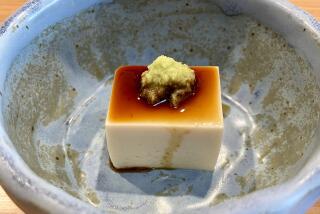Trouble for the Titan Tofu
- Share via
HONOLULU — Every week, it seems yet another study bombards Americans with conflicting health claims on everything from drinking coffee to using margarine. But who would suspect that there could be anything sinister about tofu--those bland, protein-packed, white blocks of soy curd?
Spurred by health concerns, sales of tofu and other soy foods have boomed across the country in the past few years. In November, the U.S. government gave soy protein its official stamp of approval as a means of fighting heart disease.
Soy also is credited with helping prevent osteoporosis, prostate cancer and even hot flashes, although those claims have not been validated.
But new research funded by the National Institute on Aging is casting a first, tentative shadow on the quintessential health food. A long-term study of Japanese American men in Hawaii found that they were more likely to suffer from “accelerated brain aging,” mental impairment and possibly even Alzheimer’s disease if they ate tofu at least twice a week during midlife.
The results, some of which were presented at a symposium in November in Washington, D.C., are scheduled for publication in the April issue of the Journal of the American College of Nutrition.
Known as the Honolulu-Asia Aging Study, the research is examining dementia and its causes among more than 3,700 elderly subjects in the Honolulu Heart Program, a respected study of cardiovascular disease among 8,000 Hawaii men that began in 1965.
Testing for Cognition
The participants were asked about their dietary habits in 1965-67 and 1971-74, then examined for cognitive abilities in 1991-93. Brain atrophy also was assessed by neuroimaging and autopsy in some cases.
On average, those who reported eating the most tofu functioned as if their brains were four years older than those who didn’t eat it. Tofu consumers had poorer test performance, more atrophy and nearly twice the prevalence of clinically diagnosed Alzheimer’s disease.
Cognitive testing of the men’s wives indicated similar results. Autopsies on 290 subjects showed reduced brain size among those who ate the most tofu.
This perhaps accounted for the early onset of Alzheimer’s symptoms, although no apparent increase in the lesions associated with Alzheimer’s was found in the autopsied brains.
The research found no association between mental function in old age and consumption of 26 other foods, including green tea, black tea, rice, meat, fish, milk and coffee. Miso, the only other soy food examined, showed no significant effect.
Chief investigator Dr. Lon White of the Pacific Health Research Institute is quick to point out that the data are simply a correlation, not a causal connection. He has controlled for other variables that might skew the results, such as age, education, childhood privation and pesticide exposure. But much more work is required to determine if tofu is the culprit or just a statistical anomaly.
Bill Theis, vice president of medical and scientific affairs for the National Alzheimer’s Assn. in Chicago, considers the findings too preliminary to support any conclusions.
“If I had a strong taste for tofu, I’m not sure that this study would keep me from eating it,” he said.
“Epidemiological observation is just the first step. The next step would be to determine whether modifying the diet would modify the outcome. Without that part of the puzzle, you can’t impute causation.”
If the data are borne out, White speculates that it could be because isoflavones, plant estrogens abundant in soy, might interfere with human estrogens that are important for brain health. This interference, he said, could contribute to “accelerated brain aging.”
Isoflavones are pharmacologically active molecules that act as estrogen mimics. Some people take them in concentrated pill form as health boosters, but scientists caution that they may have both good and bad effects.
A clinical trial is underway to examine the connection between estrogen and Alzheimer’s, following up on a survey that showed that women who took hormone replacement therapy after menopause had a lower risk of getting Alzheimer’s. How isoflavones might come into play is an open question. They have hormonal effects, but may affect different organs differently and at different stages in life.
At this point, the Honolulu study raises more questions than it answers. Although dementia and Alzheimer’s rates are difficult to compare internationally, they appear to be about the same in the United States, where tofu is still rare, and Japan, where it is ubiquitous.
Critic Points to Japan and China
“If soy was so bad, why is there not a greatly increased incidence of Alzheimer’s in Japan and China?” asked Dr. Kenneth Setchell, professor of pediatrics at the University of Cincinnati’s Children’s Hospital Medical Center, and an expert on phytoestrogens. “Why is there no association with any other soy food? Why don’t vegetarians, who consume soy by the buckets, get dementia?
“I don’t dispute their data, but I have a major problem with their conclusions. They took a quantum leap in suggesting that isoflavones are the cause. . . . We believe isoflavones have a positive effect on the brain.”
In stark contrast to White’s findings, a 1993 study of 272 Californians enrolled in the Adventist Health Study, matched for age, sex and ZIP Code, found that those who ate meat were more than twice as likely to become demented as their vegetarian counterparts.
A larger pool of 2,984 unmatched subjects in the Adventist study showed no significant difference in dementia rates between heavy meat eaters and vegetarians, who tend to consume a lot of soy.
No Explanation for Data Conflicts
There was no obvious explanation for the disparity, but other factors such as varying age and education in the larger population could obscure any effects of diet. In both the large group and the subgroup, there was a trend toward delayed onset of dementia in vegetarians.
White acknowledges that his findings go against the grain. He notes that the “tofu effect” in his study could be overwhelmed by other factors when comparing populations.
“It is counterintuitive that tofu would be associated with worse aging,” he said. “Nutritionists think it’s the best thing since whole-grain sliced bread. And in Japan, people tend to live a long time. It might be that this is totally wrong and that tofu has zip to do with it. Or it may reflect the kind of paradox that occurs often in science. . . .
“Sometimes we get conflicting information that simply cannot be resolved and the public can’t be told the truth for years.”
(BEGIN TEXT OF INFOBOX / INFOGRAPHIC)
A Taste for Soy Foods Sales of soy foods have shot up in recent years, as consumers seek alternatives to meat and dairy products. But a new study suggests that tofu and other soy products may have some negative effects, perhaps including an association with Alzheimer’s disease.
U.S. Tofu Sales
1992: $108 million
1999*: $238 million
U.S. Soy Food Sales
1992: $852 million
1999*: $2.14 billion
* Forecast
Source: “The U.S. Soyfoods Industry,” by Soyatech Inc. and Senechal, Jorgenson & Hale Co.






